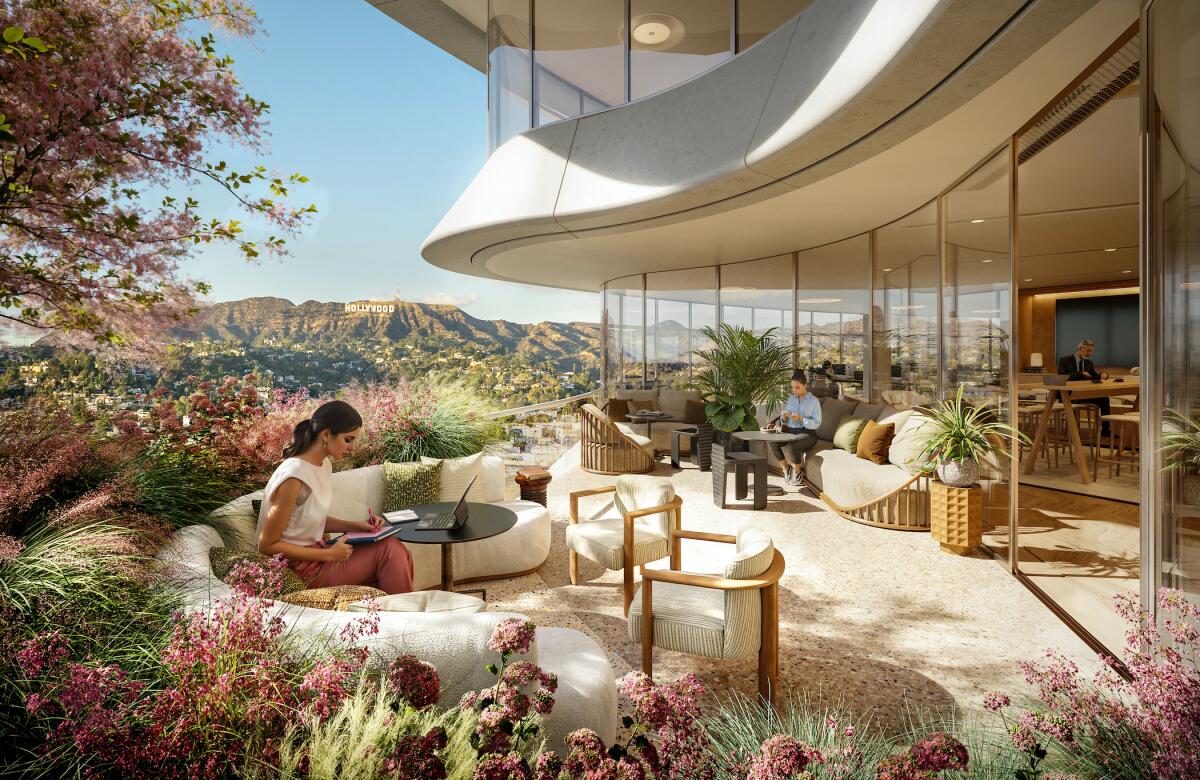At a time when office landlords are struggling to attract and keep tenants, a Hollywood real estate developer is forging ahead with plans for a visually arresting high-rise on Sunset Boulevard that would cater to the entertainment industry.
The owner of the property at 6061 Sunset, Los Angeles investor and developer Maggie Miracle, has doubled down on an earlier $500-million proposal for the site near Gower Street with a $1-billion greenery-laden “vertical campus” designed by esteemed English architect Norman Foster.
Miracle’s family-run company on Tuesday submitted to the city revised design plans for the office tower, which has been dubbed “the Star.” Renderings show a cylindrical high-rise stitched with colorful gardens spiraling from street to roof. A rooftop restaurant will be open to the public.
A rendering of the building, looking east on Sunset Boulevard.
(Foster + Partners)
Miracle made waves in 2021 with the initial plan for the tower, which was designed by MAD Architects, a Chinese firm known for daring designs such as the Lucas Museum of Narrative Art, under construction near the Los Angeles Memorial Coliseum.
Ultimately, Miracle said, she decided to scrap that design because she wanted to incorporate garden-like outdoor spaces, which have proved increasingly attractive to office tenants since the pandemic temporarily drove workers out of confined quarters.
Foster, who holds the title of lord, designed the pickle-shaped Gherkin skyscraper in London and the master plan for the $2-billion One Beverly Hills condominium and hotel complex under construction in Beverly Hills.
Foster + Partners’ vision for the 22-story Star includes the type of indoor-outdoor work spaces commonly found in low-rise office campuses and is intended to appeal “to the needs of the creative community and innovators we hope to attract,” Miracle said.
“Since COVID, the importance of a healthy workplace and access to fresh air and outdoor space has been a driver, especially for those in the entertainment and tech industries,” Miracle said. “The change in design is meant to respond to those demands.”
The new tower would also be thinner than the one previously proposed, in order to be “more respectful to the people in the hills” who look down on Hollywood, Miracle said.

Plans for the Star office building in Hollywood call for landscaped outdoor terraces serving tenants on each floor.
(Foster + Partners)
The Star’s landscaped outdoor decks, indoor gardens and rooftop restaurant would distinguish it from other office buildings, Miracle said.
The plans also call for a pathway to loop around the tower, accessible from Sunset Boulevard on both sides of the building. A lower structure next to the tower would be wrapped with an expansive LED video screen showing digital art and images generated by tenants, Miracle said. Current rules would not allow it to be used for advertising.
The proposal calls for restaurants, entertainment production space, a theater and exhibition space for art shows and other events on the Star’s ground level. Parking for nearly 1,300 vehicles would be underground.
Although the plans haven’t been approved by the city, Miracle hopes to start work on the 525,000-square-foot building by late 2026 and open its doors in 2029. The Star is the first commercial development for Miracle, who is known for building deluxe single-family properties.
With completion that far away, predicting what the office rental market will be like is difficult. Real estate brokerage CBRE reported that 22.7% of Hollywood office space was vacant in the fourth quarter, about the same as Los Angeles County overall. A healthy vacancy rate is closer to 10%, when neither landlords nor tenants typically have the upper hand in lease negotiations.
But Hollywood has been one of the most active office leasing markets recently, analyst Petra Durnin said; the newest buildings, sporting such amenities as outdoor decks and restaurants, are getting the most attention.
“These highly amenitized office buildings command the highest rents in the Hollywood market and account for some of the largest deals signed in the last nine months,” said Durnin, head of market analytics at Raise Commercial Real Estate. She is not involved in the Star project.
Pent-up demand has increased leasing activity in Hollywood, in “a huge boon to a neighborhood that was disproportionately affected by the pandemic, downturn in the tech industry and strikes by writers and actors,” Durnin said.
Miracle said she is betting that the neighborhood will continue to grow as a business center. Her Star complex would rise across the street from Sunset Gower Studios, a century-old movie studio that was once home to Columbia Pictures and now includes an office building housing Technicolor. Nearby is Columbia Square, the renovated former West Coast headquarters of CBS, and Emerson College, an architecturally noteworthy building where students live and study the arts. Netflix, the largest office tenant in Hollywood, has offices and studios nearby.
“We believe Hollywood is a unique and irreplaceable market both geographically and from an industry perspective,” she said. “The growth of content creation and the demands of the companies that produce it are beyond what today’s current office products can accommodate.”
The over-the-top design of the Star is intentional, she said.
“Our goal is to create a landmark building that is synonymous with the images that Hollywood evokes: innovation, creativity, fantasy and imagination.”


